Last Updated on June 5, 2023 by Dee
Hello and welcome, aspiring artists and flower enthusiasts! Ready to enhance your artistic skills with a lovely hibiscus flower drawing? You’ve come to the right place! In this guide, we’ll take you step by step through a comprehensive drawing tutorial designed to help you master the art of the hibiscus.
[Related Article: Pen & Watercolor Flowers Tutorials]
So, how can you do your own hibiscus flower drawing?
Hibiscus Flower Drawing: Step-By-Step
Step 1- Collecting your reference material
If you want to draw a hibiscus flower it is a good idea to get a clear and good quality reference image to work from.
Work from your imagination
You can work from your imagination, but the truth is that most people’s brains leave out important information about the original flower. As a result, the flower may become more stylized or simplified than the original.
Work from your own photos
Drawing from your own photos is a great way to come up with unique ideas and compositions. You also have first-hand experience of what the lily looks like in a real-life situation. This gives you a better idea of how the subject matter “sits in space” so to speak.
Work from a free stock photo
Because I wanted a level of naturalism in my artwork, I chose to work from a photograph of a hibiscus plant that I found on unsplash.com.
Step 2: Decide on the size of your drawing
I find that working on an A4 or A3 sheet of watercolor paper is a good size to start off with for botanical art. The hibiscus plant I painted is on an A4 sheet of paper.
I would recommend sticking to at least A4 in size, because if you work any smaller you may struggle to get a good amount of detail in your drawing or painting.
Step 3: Composition and rough drawing of the general shapes of the hibiscus plant
Once you have decided on the size of the paper you will be working on, you can think about your composition and then draw it out in pencil.
Think carefully about how you will position the hibiscus flowers on your page.
I recommend using a 2B lead pencil to first softly sketch out the general shapes of the hibiscus’ petals, leaves, and stem. Make sure you are applying only a very light pressure onto the pencil to achieve very light pencil marks on the page.
I have start my hibiscus flower drawing by sketching out the general curved lines that the flower heads will fit into.
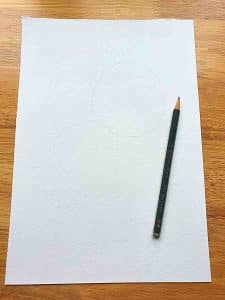
Step 4: Defining Form
Once you have sketched the light general shapes of the hibiscus flowers, then you can start going over the petals, stem, and leaves again and making changes and alterations to your shapes in order to get your subject matter looking more accurate. I use a kneadable eraser because I find it great to be able to manipulate its shape so that I can erase lines in small places and awkward angles!

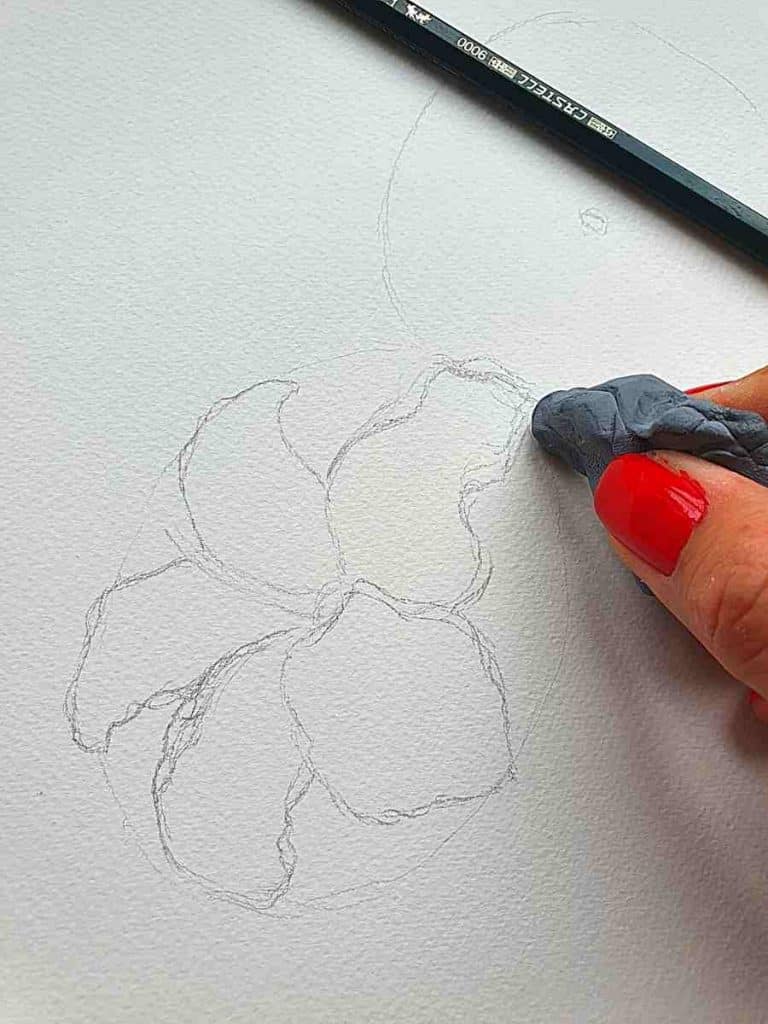
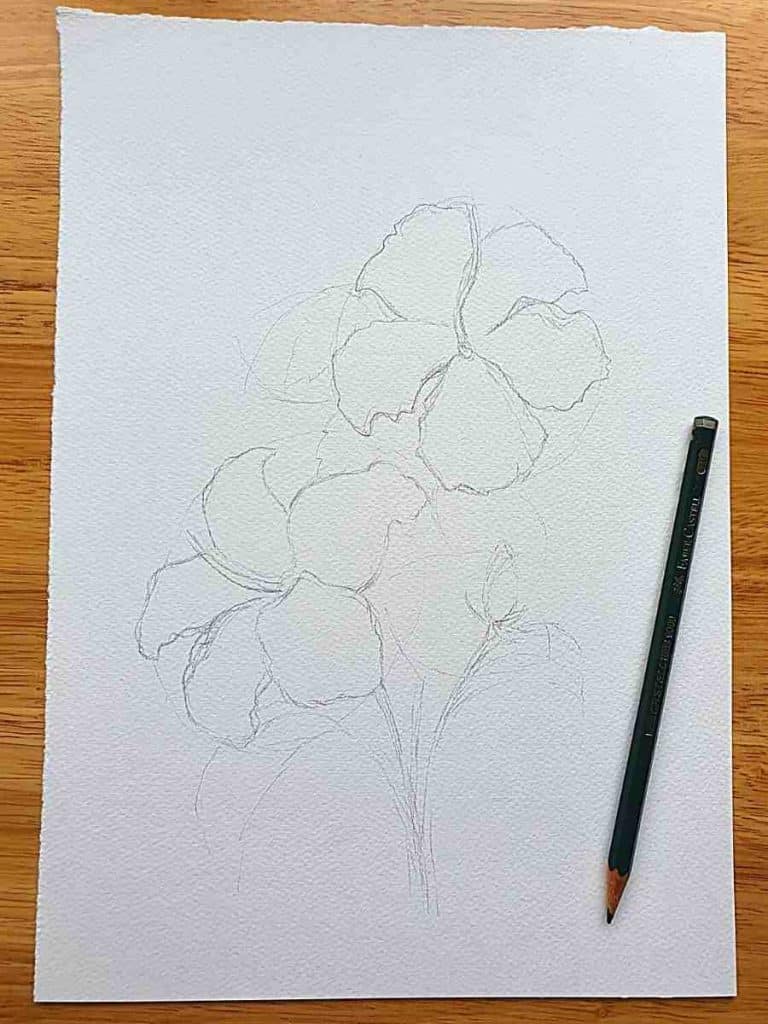
Step 5: Go over the pencil marks in pen
Once you have sketched the general shapes of the hibiscus flower and have a good idea of how it works together, then you can start going over your pencil lines with pen.


Step 5: Begin shading
Remember to check where your light source is! This is so important in order to accurately draw forms and get a sense of three-dimensionality. Your shadows will fall opposite your light source.
[Related Post: How to Improve your Drawing…Follow These Top Tips!]
I personally find that using combination of shading techniques to build up density of form and deepen my shadows works really well.
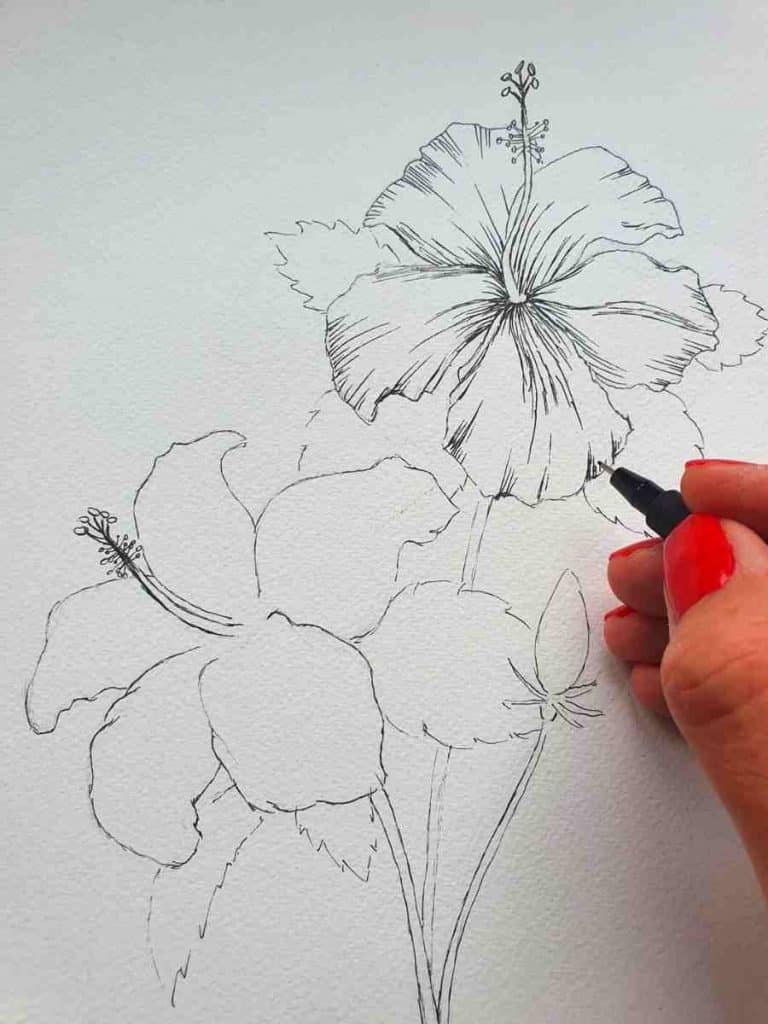

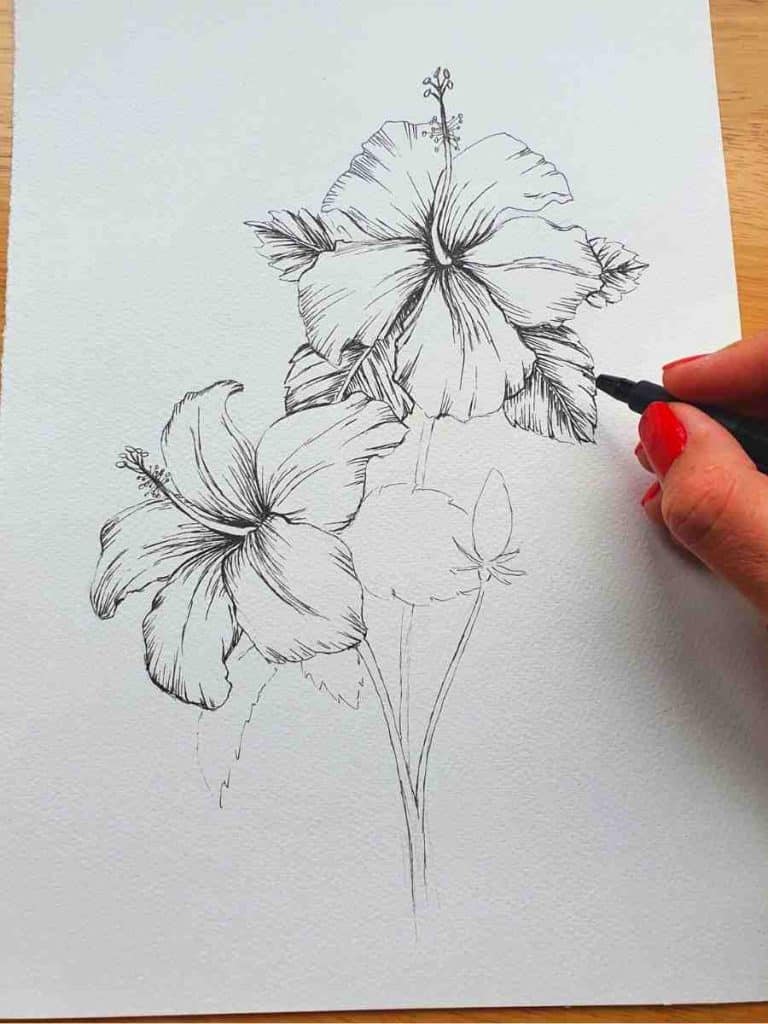
Step 6: Shade the stem and the bud, and final details
Continue to deepen your shading and shadows and use fine cross-hatching to create a sense of shadow on the stem and the bud of your hibiscus plant.
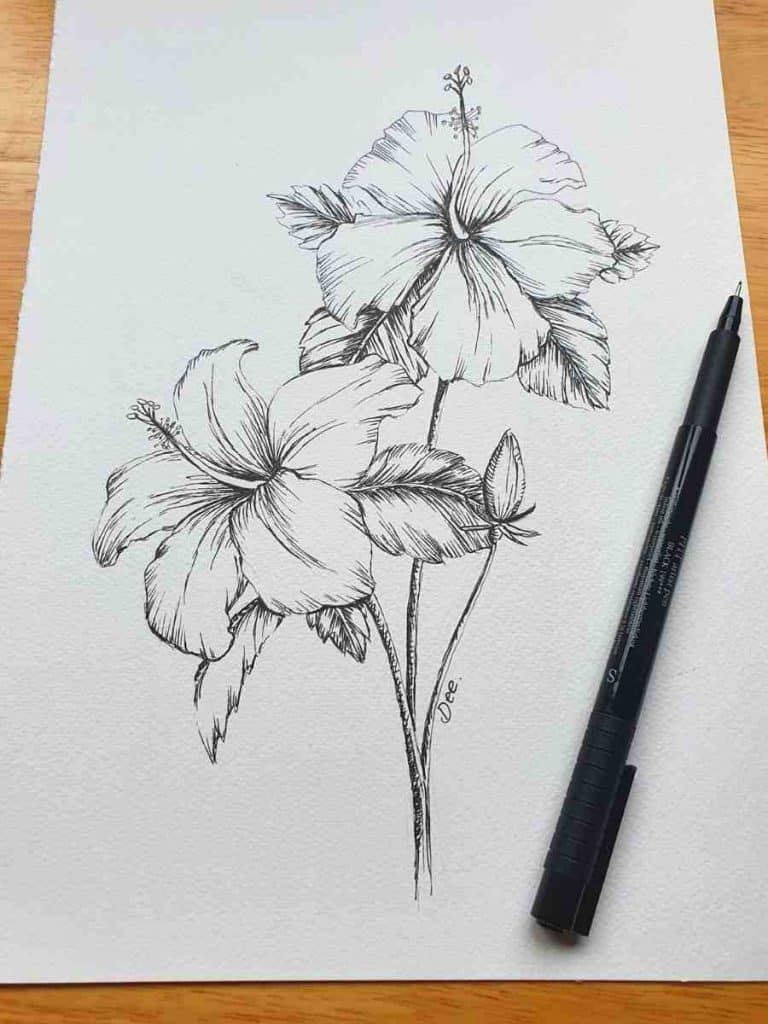
Step 8: Paint washes of your lightest color
As you begin painting with watercolor you will be using a technique called wet-on-dry. Essentially that means you are putting paint on your paintbrush and then painting directly onto the dry surface of the page. This is a good way to start because you have more control over the areas you are painting color.
I started by painting very soft washes of rose pink over the petals of the hibiscus flowers.
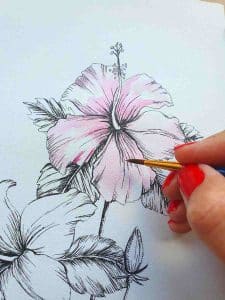
[Related Post: How to Paint Gorgeous Cherry Blossoms]
Step 9: Layers of washes to darker areas of the flowers
Continue to paint layers of washes on top of one another to build up depth and deepen shadow areas. As you can see, I used a deep blue over some shadow areas to add interest and depth to the petals.
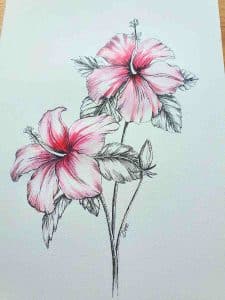
Step 10: Washes of green on the stems and the leaves
Paint light washes of green on the stem.
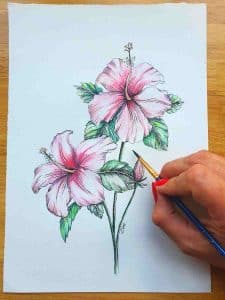
Step 11: Final Details
Lastly I painted an orange wash over the stamens and also painted the tips of the hairs with yellow. I chose to use these colors so that the stamen stood out against the background of the petals.
Remember the following when you draw a hibiscus flower…
Stand Back
Make sure to stand back regularly to observe how your drawing is developing. It is also important that you give yourself mental and visual breaks so that you can continue to draw accurately.
Sharp Pencil
Remember to keep your pencil sharp. This is important because often we get so engrossed in our drawing that we forget that a sharp pencil helps with fine lines and details.
Play & Experiment
It is a good idea to always have a scrap piece of paper nearby, in order to test out your shapes and shading techniques while you draw a hibiscus flower.
Other ways to use a Hibiscus Drawing
Once you have practiced how to draw a hibiscus flower you can use this skill for hibiscus flower tattoos, hibiscus painting printables, hibiscus flower crafts, or even as a coloring page! Many people really enjoy creating their own personal coloring page to use as a meditative tool!
List of materials and supplies needed to do your own Hibiscus Flower Drawing
The Best Painting and Drawing Supplies for Artists2B, 4B, 6B, and 8B Pencil
Kneadable Eraser
Scrap piece of paper for testing colors
300gsm Watercolor Paper
If you want to add a wash to your drawing you should definitely do your drawing on a good-quality, heavy paper that doesn’t buckle.
Soft Bristle Round or Filbert Brush
Watercolor pans or tubes
I am currently using the Windsor and Newton Watercolor Pan. The colors are rich and the tray itself is portable and easy to use.
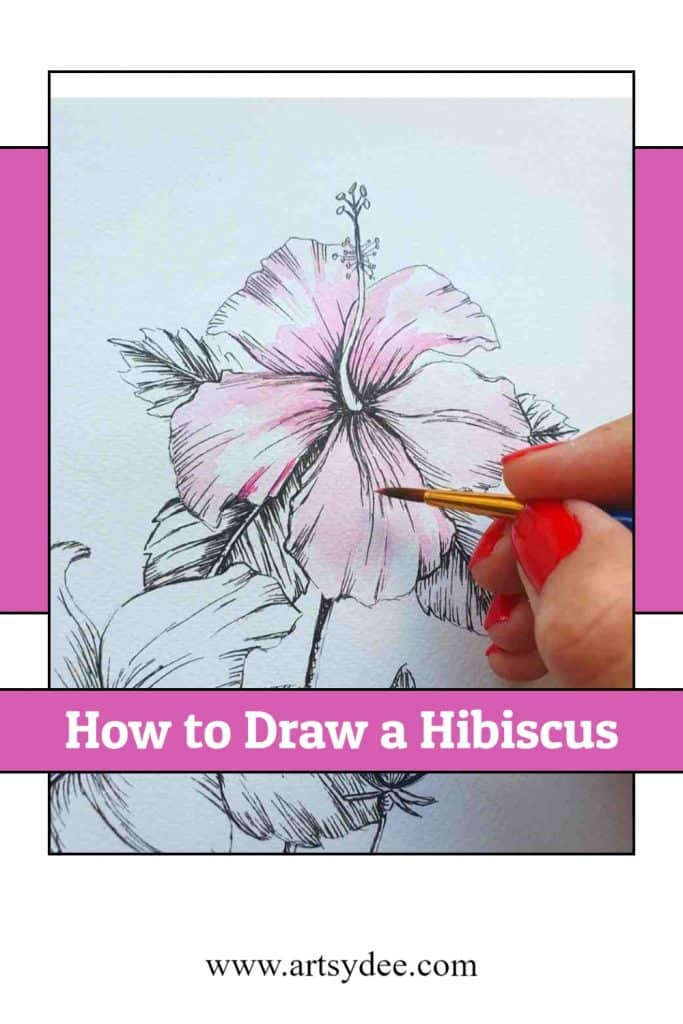
Conclusion
Congratulations! You’ve made it through our comprehensive hibiscus flower drawing tutorial. By now, you should have a beautiful drawing and a better understanding of how to use a curved line to add depth and dimension, as well as how to draw the third petals for a more realistic hibiscus.
Remember, practice is the key to improvement. So, keep using these techniques to draw a hibiscus flower, and soon you’ll be creating stunning floral art with ease. Thank you for joining us, and happy drawing!
Other articles you may enjoy…
Drawing Tools Unleashed: Top Picks for Every Artist
Draw Like a Pro with a Drawing Projector: The Ultimate Tool for Artists
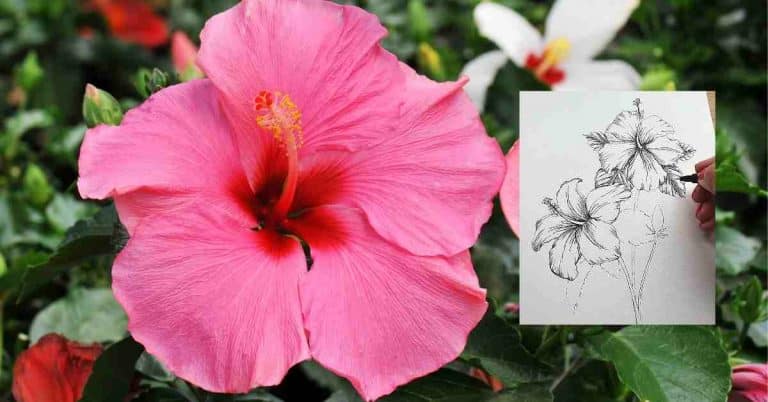
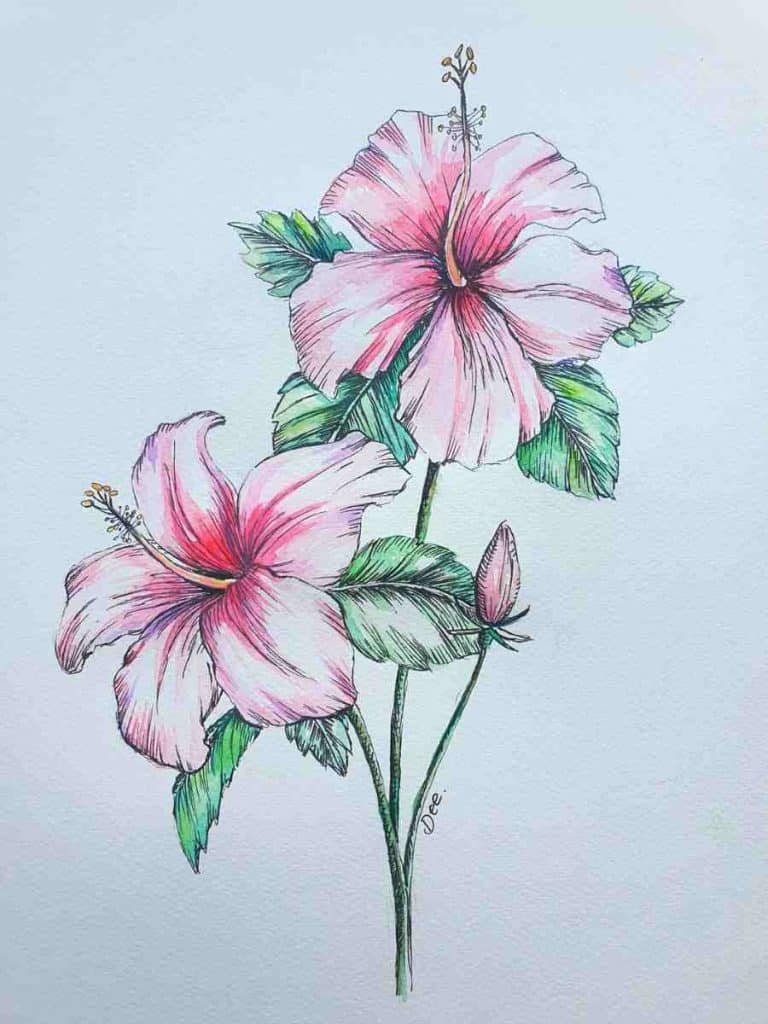
Love your drawing and how you explain i am very new to all this
I am glad to hear that! Let me know if there is anything else you need help with 🙂
This exquisite hibiscus flower drawing is a true masterpiece! I am amazed by the attention to detail and the lifelike representation of the delicate petals and vibrant colors. It truly captures the beauty and essence of this mesmerizing flower. The artist’s talent shines through every stroke, making this artwork a captivating sight to behold. I can’t help but feel a sense of serenity and joy just by gazing at it. Thank you for sharing this stunning piece of art with the world!
-Martin Williamson
Thank you so much!
Hi there! I just came across your website, and I absolutely fell in love with your hibiscus flower drawing. The level of detail and precision is truly remarkable. The vibrant colors and delicate strokes bring the flower to life, making it a visual delight. It’s evident that you have a true talent for capturing the essence of nature through your artwork. Thank you for sharing your beautiful creations with the world. Keep up the amazing work, and I look forward to seeing more of your incredible drawings!
-Tristian
Thank you for your kind message Tristian! Glad I could inspire you! Keep making art 🙂